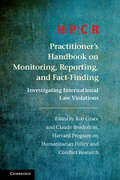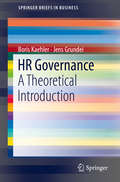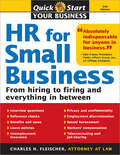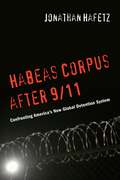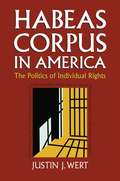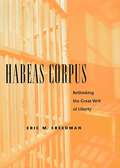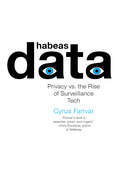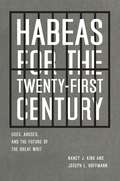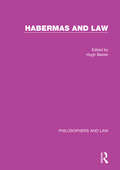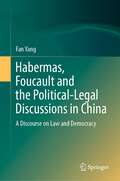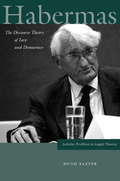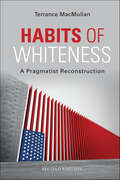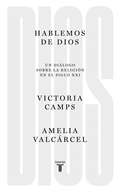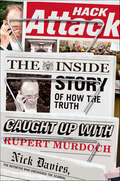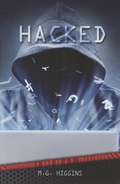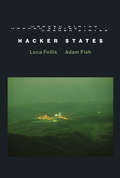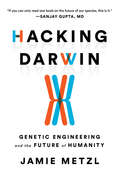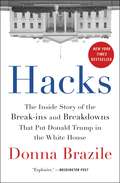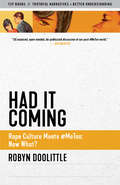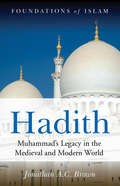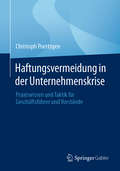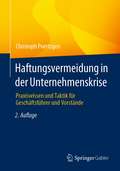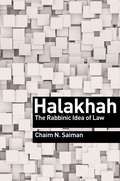- Table View
- List View
HPCR Practitioner's Handbook on Monitoring, Reporting, and Fact-Finding: Investigating International Law Violations
by Claude Bruderlein Rob GraceThis book offers a portrait of the practice of monitoring, reporting, and fact-finding in the domain of human rights, international humanitarian law, and international criminal law. By analyzing the experiences of fifteen missions implemented over the course of the past decade, the book illuminates the key issues that these missions face and offers a roadmap for practitioners working on future missions. This book is the result of a five-year research study led by the Program on Humanitarian Policy and Conflict Research at Harvard University, Massachusetts. Based on extensive interviews conducted with fact-finding practitioners, this book consists of two parts. Part I offers a handbook that details methodological considerations for the design and implementation of fact-finding missions and commissions of inquiry. Part II - which consists of chapters written by scholars and practitioners - presents a more in-depth, scholarly examination of past fact-finding practices.
HR Governance: A Theoretical Introduction (SpringerBriefs in Business)
by Boris Kaehler Jens GrundeiHuman resource (HR) governance is a relatively new construct that has recently begun attracting more and more attention in both research and practice. As a part of corporate governance, it represents the internal and external normative framework of human resource management and its supervision in organizations. This book theoretically integrates HR governance with the related domains of corporate governance, general management, HR management, and leadership. By doing so, it provides scholars and practitioners in the field with a precisely delineated system of theoretical concepts for their work and helps to translate these concepts into concrete research questions and practical guidelines. By interpreting the new ISO 30408 norm on human governance and taking into account recent developments, the book helps to comply with and anticipate current and future HR regulations.
HR for Small Business: An Essential Guide for Managers, Human Resources Professionals, and Small Business Owners
by Charles H. FleischerOne of the few [references] geared to the bulk of American business. -- Booklist. HR For Small Business explains in simple, clear language what business owners and managers need to know about their relationship with their employees in order to comply with the law and protect themselves and their business from being sued. The new edition of this book includes everything from recruiting and hiring to discipline and termination and everything in between. Updated legal information has been added on the new minimum wage law that employers must be aware of, the right to privacy for employees, especially in terms of their email, Internet usage, and phone calls, and what employers need to do to comply with disability laws and FMLA. The appendices in this book include required postings in the workplace, legal holidays, online resources for employers and human resource professionals, a sample employee handbook outline, an employer tax calendar, and a complete glossary of terms. Absolutely indispensable for anyone in business. - Edie Fraser, President, Public Affairs Group, Inc. , an iVillage Company Featuring: Interview questions Reference checks Benefits and taxes Leave policies Unemployment insurance Privacy and confidentiality Employment discrimination Sexual harassment Workers' compensation Telecommuting and job-sharing Employees are your greatest asset. However, the days when employee matters were simple are gone. To keep your business running successfully, you need a guide through the many issues facing employers today. Charles Fleischer, successful attorney, lecturer, and author, makes this complex area of the law easy to understand. His practical advice answers the questions you have, such as: What steps do I take in the hiring process? How can I use performance evaluations as a productive tool? How can I cut overtime expenses? How can I control costs and still offer attractive retirement and health insurance benefits? How do I make a clean termination? How do I protect myself against discrimination claims? What types of insurance must I carry? How long must I hold a position for someone on maternity, military, or other leave? Start building a stronger workforce today.
Habeas Corpus after 9/11: Confronting America’s New Global Detention System
by Jonathan Hafetz2012 American Bar Association Gavel Award Honorable Mention for Books2012 Scribes Book Silver Medal Award presented by the American Society of Legal WritersThe U.S. detention center at Guantánamo Bay has long been synonymous with torture, secrecy, and the abuse of executive power. It has come to epitomize lawlessness and has sparked protracted legal battles and political debate. For too long, however, Guantánamo has been viewed in isolation and has overshadowed a larger, interconnected global detention system that includes other military prisons such as Bagram Air Base in Afghanistan, secret CIA jails, and the transfer of prisoners to other countries for torture. Guantánamo is simply—and alarmingly—the most visible example of a much larger prison system designed to operate outside the law.Habeas Corpus after 9/11 examines the rise of the U.S.-run global detention system that emerged after 9/11 and the efforts to challenge it through habeas corpus (a petition to appear in court to claim unlawful imprisonment). Habeas expert and litigator Jonathan Hafetz gives us an insider’s view of the detention of “enemy combatants” and an accessible explanation of the complex forces that keep these systems running. In the age of terrorism, some argue that habeas corpus is impractical and unwise. Hafetz advocates that it remains the single most important check against arbitrary and unlawful detention, torture, and the abuse of executive power.
Habeas Corpus in America: The Politics of Individual Rights
by Justin J. WertFrom the author: During the summer of 2001 I set out to research and write about habeas corpus, the purported Great Writ of Liberty. Like many others before me--and, I hope, many after me--I was first intrigued with Abraham Lincoln's use (or nonuse) of the writ during the first months of his fateful presidency. Speaking before a Congress that he called into special session on 4 July 1861, Lincoln asked those representatives who still remained with Union a question that we today still have not answered adequately: "Are all the laws but one to go unexecuted and the government itself go to pieces, lest that one be violated?" Few questions, I thought, were as important as this one, not only from the perspective of political science, but also from the perspective of all citizens who take seriously a necessary sense of duty to country. I would now go forth and attempt to chart the contours of Lincoln's question, taking as my case study his controversial suspension of habeas during the Civil War years. I was confident that a sustained look at habeas's suspension could yield new perspectives and new ways of understanding this immensely important question.
Habeas Corpus in International Law
by Farrell Brian R.Habeas Corpus in International Law is the first comprehensive examination of this subject. It looks at the location, scope, and significance of the right to a judicial determination of the legality of one's detention as guaranteed by international and regional human rights instruments. First, it examines the history of habeas corpus and its place in human rights treaties, providing a useful resource for understanding the status and application of this internationally-protected right. The book continues by identifying and analyzing the primary challenges to habeas corpus, in particular its applicability during armed conflict, the possibility of derogation, and its extraterritorial application and procedural shortcomings. The book next addresses the significance of habeas corpus guarantees not just in protecting personal liberty, but in promoting the international rule of law by serving as a unique check on executive action. Finally, it offers suggestions on how this right might be strengthened.
Habeas Corpus: Rethinking the Great Writ of Liberty
by Eric M. FreedmanHabeas Corpus is the process by which state prisoners—particularly those on death row—appeal to federal courts to have their convictions overturned. Its proper role in our criminal justice system has always been hotly contested, especially in the wake of 1996 legislation curtailing the ability of prisoners to appeal their sentences.In this timely volume, Eric M. Freedman reexamines four of the Supreme Court’s most important habeas corpus rulings: one by Chief Justice John Marshall in 1807 concerning Aaron Burr’s conspiracy, two arising from the traumatic national events of the 1915 Leo Frank case and the 1923 cases growing out of murderous race riots in Elaine County, Arkansas, and one case from 1953 that dramatized some of the ugliest features of the Southern justice of the period. In each instance, Freeman uncovers new original sources and tells the stories of the cases through such documents as the Justices’ draft opinions and the memos of law clerk William H. Rehnquist. In bracing and accessible language, Freedman then presents an interpretation that rewrites the conventional view.Building on these results, he challenges legalistic limits on habeas corpus and demonstrates how a vigorous writ is central to implementing the fundamental conceptions of individual liberty and constrained government power that underlie the Constitution.
Habeas Data: Privacy vs. the Rise of Surveillance Tech
by Cyrus FarivarA book about what the Cambridge Analytica scandal shows: That surveillance and data privacy is every citizens’ concernAn important look at how 50 years of American privacy law is inadequate for the today's surveillance technology, from acclaimed Ars Technica senior business editor Cyrus Farivar.Until the 21st century, most of our activities were private by default, public only through effort; today anything that touches digital space has the potential (and likelihood) to remain somewhere online forever. That means all of the technologies that have made our lives easier, faster, better, and/or more efficient have also simultaneously made it easier to keep an eye on our activities. Or, as we recently learned from reports about Cambridge Analytica, our data might be turned into a propaganda machine against us. In 10 crucial legal cases, Habeas Data explores the tools of surveillance that exist today, how they work, and what the implications are for the future of privacy.
Habeas for the Twenty-First Century: Uses, Abuses, and the Future of the Great Writ
by Nancy J. King Joseph L. HoffmannFor centuries, the writ of habeas corpus has served as an important safeguard against miscarriages of justice, and today it remains at the center of some of the most contentious issues of our time—among them terrorism, immigration, crime, and the death penalty. Yet, in recent decades, habeas has been seriously abused. In this book, Nancy J. King and Joseph L. Hoffmann argue that habeas should be exercised with greater prudence. Through historical, empirical, and legal analysis, as well as illustrative case studies, the authors examine the current use of the writ in the United States and offer sound reform proposals to help ensure its ongoing vitality in today’s justice system. Comprehensive and thoroughly grounded in a modern understanding of habeas corpus, this informative book will be an insightful read for legal scholars and anyone interested in the importance of habeas corpus for American government.
Habeas for the Twenty-First Century: Uses, Abuses, and the Future of the Great Writ
by Nancy J. King Joseph L. HoffmannFor centuries, the writ of habeas corpus has served as an important safeguard against miscarriages of justice, and today it remains at the center of some of the most contentious issues of our time—among them terrorism, immigration, crime, and the death penalty. Yet, in recent decades, habeas has been seriously abused. In this book, Nancy J. King and Joseph L. Hoffmann argue that habeas should be exercised with greater prudence. Through historical, empirical, and legal analysis, as well as illustrative case studies, the authors examine the current use of the writ in the United States and offer sound reform proposals to help ensure its ongoing vitality in today’s justice system. Comprehensive and thoroughly grounded in a modern understanding of habeas corpus, this informative book will be an insightful read for legal scholars and anyone interested in the importance of habeas corpus for American government.
Habermas and Law
by Hugh BaxterHabermas and Law makes accessible the most important essays in English that deal with the application to law of the work of major philosophers for whom law was not a main concern. It encompasses not only what these philosophers had to say about law but also brings together essays which consider those aspects of the work of major philosophers which bear on our interpretation and assessment of current law and legal theory. The essays are based on scholarly study of particular philosophers and deal with both the nature and role of law and the application of philosophy to specific areas of law.
Habermas, Foucault and the Political-Legal Discussions in China: A Discourse on Law and Democracy
by Fan YangThis book revisits the discourse theories of Habermas and Foucault in a Chinese context. After arguing that Habermas’s Discourse Theory of Law and Democracy is too normative and idealistic, it presents Foucault’s Discourse Theory of Power Relations to illustrate the tensions between different Western discourse theories. The book then draws on the normative concept of Confucian Rationality from traditional Chinese cultural sources in order to investigate how adaptable these two discourse theories are to the Chinese society, and to balance the tension between them. Presenting these three dimensions of discourse theory, as well as the relations between them, it also uses empirical descriptions of certain facts of political-legal discussion both in traditional China and in the country’s new media age to explain, supplement and question this theoretic framework.The book asserts that, because of the diverse modes of thinking in specific cultures, there might be different normative paradigms of discorse and different political-legal discussion modes across corresponding cultural contexts. Normative discourse theories provide guidance for the practices of deliberative democracy and legal discussions, which can in turn verify, supplement, improve and challenge the normative discourse theories. In addition to demonstrating the multiple dimensions of discourse theories, this research also promotes an approach to the Discourse Theory of Law and Democracy that combines elements of both Chinese and modern society.
Habermas: The Discourse Theory of Law and Democracy
by Hugh BaxterThough many legal theorists are familiar with Jürgen Habermas's work addressing core legal concerns, they are not necessarily familiar with his earlier writings in philosophy and social theory. Because Habermas's later work on law invokes, without significant explanation, the whole battery of concepts developed in earlier phases of his career, even otherwise sympathetically inclined legal theorists face significant obstacles in evaluating his insights. A similar difficulty faces those outside the legal academy who are familiar with Habermas's earlier work. While they readily comprehend Habermas's basic social-theoretical concepts, without special legal training they have difficulty reliably assessing his recent engagement with contemporary legal thought. This new work bridges the gap between legal experts and those without special legal training, critically assessing the attempt of an unquestionably preeminent philosopher and social theorist to engage the world of law.
Habits of Whiteness: A Pragmatist Reconstruction (American Philosophy)
by Terrance MacMullanHabits of Whiteness: A Pragmatist Reconstruction, second edition, offers a revised and updated look at the concept of whiteness in the United States. Lauded when it was first published and even more relevant today, Habits of Whiteness offers a distinctive way to talk about race and racism by focusing on racial habits and how to change them.Author Terrance MacMullan examines how the concept of racial whiteness has undermined attempts to create a truly democratic society in the United States. By getting to the core of the racism that lives on in unrecognized habits, MacMullan argues that it is possible for white people to recognize the distance between their color-blind ideals and their actual behavior. Revitalizing the work of W. E. B. Du Bois and John Dewey, MacMullan demonstrates how it is possible to reconstruct racial habits and close fissures between people. This second edition of Habits of Whiteness also contains a new introduction, which looks closely at race relations during the Obama and Trump presidencies, including such recent challenges as police brutality in 2020, white supremacy, and the Capitol insurrection. Its persuasive analysis of the impulses of whiteness ultimately reorganizes them into something more compatible with our country's increasingly multicultural heritage.
Hablemos de Dios: Un diálogo sobre la religión en el siglo XXI
by Victoria CampsDos pensadoras clave exploran el lugar de las religiones de nuestro mundo, la tendencia al fundamentalismo y la posibilidad de una moral universal. ¿Una moral sin religión es una moral desprovista de fundamento? ¿Es posible pretender una moral universal que pueda ser compartida por creyentes y no creyentes? ¿Qué cabe esperar de las religiones, para bien y para mal? ¿Satisfacen las creencias religiosas alguna necesidad que no puede ser satisfecha de otra forma? ¿Se pueden acercar las posiciones de los creyentes y los no creyentes que deben convivir en una misma sociedad? Éstas y otras muchas preguntas se plantean Victoria Camps y Amelia Valcárcel en este ameno diálogo epistolar sobre la situación de la religión en el giro del nuevo siglo. Desde el deseo de reflexionar sobre la actual situación de lo religioso y con la base de la filosofía occidental, ambas exploran el lugar de las religiones en nuestro mundo, el poder de losmonoteísmos y su tendencia a desviarse hacia el fundamentalismo, la secularización y la posibilidad de una moral universal. En un momento en que en España muchos reclaman, más que nunca, la salida definitiva de la religión de la vida pública, esta defensa desapasionada pero demoledora de la laicidad está más vigente que nunca. Reseña:«El libro, escrito con mucha chispa y poderosa argumentación" cautiva. Difícil sustraerse a sus tesis.»Reyes Mate, El País
Hack Attack: The Inside Story of How the Truth Caught Up with Rupert Murdoch
by Nick DaviesThe definitive book on how the News of the World phone-hacking scandal reached the highest echelons of power in the government, security, and media in the UK, from the journalist who broke the story.At first, it seemed like a small story. The royal editor of the News of the World was caught listening to the voicemail messages of staff at Buckingham Palace. He and a private investigator were jailed, and the case was closed. But Nick Davies, special correspondent for The Guardian, knew that it didn't add up. He began to investigate, and ended up exposing a world of crime and cover-up, of fear and favor—the long shadow of Rupert Murdoch's media empire.Hack Attack is the mesmerizing story of how Davies and a small group of lawyers and politicians took on one of the most powerful men in the world—and beat him. It exposes the inner workings of the ruthless machine that was the News of the World, and of the private investigators who hacked phones, listened to live calls, sent Trojan horse emails, bribed the police, and committed burglaries to dig up tabloid scoops. Above all, it is a study of the private lives of the power elite. It paints an intimate portrait of the social network that gave Murdoch privileged access to government, and allowed him and his lieutenants to intimidate anyone who stood up to them. Spanning the course of the investigation from Davies's contact with his first source in early 2008 to the resolution of the criminal trial in June 2014, this is the definitive record of one of the major scandals of our time, written by the journalist who was there every step of the way.
Hacked (Red Rhino Nonfiction)
by M. G. Higgins<p>Look out! Your computer data is not safe. There are hackers who will steal it. Sell it. Or destroy it. The hackers are getting smarter. They leave little trace as to their identities. And there are dangerous consequences for individuals, corporations, and governments. <p>Engage your most struggling readers in grades 3-8 with Red Rhino Nonfiction! This new series features high-interest topics in every content area. Visually appealing full-color photographs and illustrations, fun facts, and short chapters keep emerging readers focused. Written at a 1.5-1.9 readability level, these books include pre-reading comprehension questions and a 20-word glossary for comprehension support.</p>
Hacker States (The Information Society Series)
by Adam Fish Luca FollisHow hackers and hacking moved from being a target of the state to a key resource for the expression and deployment of state power.In this book, Luca Follis and Adam Fish examine the entanglements between hackers and the state, showing how hackers and hacking moved from being a target of state law enforcement to a key resource for the expression and deployment of state power. Follis and Fish trace government efforts to control the power of the internet; the prosecution of hackers and leakers (including such well-known cases as Chelsea Manning, Edward Snowden, and Anonymous); and the eventual rehabilitation of hackers who undertake “ethical hacking” for the state. Analyzing the evolution of the state's relationship to hacking, they argue that state-sponsored hacking ultimately corrodes the rule of law and offers unchecked advantage to those in power, clearing the way for more authoritarian rule. Follis and Fish draw on a range of methodologies and disciplines, including ethnographic and digital archive methods from fields as diverse as anthropology, STS, and criminology. They propose a novel “boundary work” theoretical framework to articulate the relational approach to understanding state and hacker interactions advanced by the book. In the context of Russian bot armies, the rise of fake news, and algorithmic opacity, they describe the political impact of leaks and hacks, hacker partnerships with journalists in pursuit of transparency and accountability, the increasingly prominent use of extradition in hacking-related cases, and the privatization of hackers for hire.
Hacking Darwin: Genetic Engineering and the Future of Humanity
by Jamie Metzl"A gifted and thoughtful writer, Metzl brings us to the frontiers of biology and technology, and reveals a world full of promise and peril." — Siddhartha Mukherjee MD, New York Times bestselling author of The Emperor of All Maladies and The GeneA groundbreaking exploration of genetic engineering and its impact on the future of our species from leading geopolitical expert and technology futurist, Jamie Metzl.At the dawn of the genetics revolution, our DNA is becoming as readable, writable, and hackable as our information technology. But as humanity starts retooling our own genetic code, the choices we make today will be the difference between realizing breathtaking advances in human well-being and descending into a dangerous and potentially deadly genetic arms race. Enter the laboratories where scientists are turning science fiction into reality.In this captivating and thought-provoking nonfiction science book, Jamie Metzl delves into the ethical, scientific, political, and technological dimensions of genetic engineering, and shares how it will shape the course of human evolution.Cutting-edge insights into the field of genetic engineering and its implications for humanity's futureExplores the transformative power of genetic technologies and their potential to reshape human lifeExamines the ethical considerations surrounding genetic engineering and the choices we face as a speciesEngaging narrative that delves into the scientific breakthroughs and real-world applications of genetic technologiesProvides a balanced perspective on the promises and risks associated with genetic engineeringRaises thought-provoking questions about the future of reproduction, human health, and our relationship with natureDrawing on his extensive background in genetics, national security, and foreign policy, Metzl paints a vivid picture of a world where advancements in technology empower us to take control of our own evolution, but also cautions against the pitfalls and ethical dilemmas that could arise if not properly managed.Hacking Darwin is a must-read for anyone interested in the intersection of science, technology, and humanity's future.
Hacks: The Inside Story Of The Break-ins And Breakdowns That Put Donald Trump In The White House
by Donna Brazile<P>"This book is a triumph."---Walter Isaacson <P>From Donna Brazile, former DNC chair and legendary political operative, an explosive and revealing new look at the 2016 election: the first insider account of the Russian hacking of the DNC and the missteps by the Clinton campaign and Obama administration that enabled a Trump victory. <P>In the fallout of the Russian hacking of the Democratic National Committee--and as chaos threatened to consume the party's convention--Democrats turned to a familiar figure to right the ship: Donna Brazile. Known to millions from her frequent TV appearances, she was no stranger to high stakes and dirty opponents, and the longtime Democratic strategist had a reputation in Washington as a one-stop shop for fixing sticky problems. What Brazile found at the DNC was unlike anything she had experienced before--and much worse than is commonly known. <P>The party was beset by infighting, scandal, and hubris, while reeling from a brazen and wholly unprecedented attempt by a foreign power to influence the presidential election. Plus, its candidate, Hillary Clinton, faced an opponent who broke every rule in the political playbook. Packed with never-before-reported revelations about what went down in 2016, Hacks is equal parts campaign thriller, memoir, and roadmap for the future. With Democrats now in the wilderness after this historic defeat, Hacks argues that staying silent about what went wrong helps no one. Only by laying bare the missteps, miscalculations, and crimes of 2016, Brazile contends, will Americans be able to salvage their democracy. <P><b>A New York Times Bestseller</b>
Had it Coming: Rape Culture Meets #MeToo: Now What? (Sunlight Editions)
by Robyn DoolittleHad It Coming is not a diatribe or manifesto, but an informed look at how attitudes around sexual behavior have changed and still need to change. "As a culture we aren't very good at having nuanced, complicated discussions," Doolittle writes in her introduction. "The public space is not a safe venue to talk about controversial subjects. Social media has seen to that . . . I've come to embrace the complexities and messiness that comes with those tough conversations."Doolittle brings a personal voice to what has been a turning point for most women: the #MeToo movement and its aftermath. The world is now increasingly aware of the pervasiveness of rape culture in which powerful men got away with sexual assault and harassment for years, but Doolittle looks beyond specific cases to the big picture. The issue of "consent" figures largely: not only is the public confused about what it means, but an astounding number of legal authorities are too.
Hadith
by Jonathan A. C. BrownContrary to popular opinion, the bulk of Islamic law does not come from the Qur'an but rather from hadith, first-hand reports of the prophet Muhammad's words and deeds, passed from generation to generation. However, with varying accounts often only committed to paper a century after the death of Muhammad, Islamic scholars, past and present, have been faced with complex questions of historical authenticity. Informative and accessible, this wide-ranging introduction provides a detailed exploration of the collection and criticism of hadith and examines the controversy surrounding its role in modern Islam. Complete with a glossary, extensive bibliography, and helpful diagrams, Hadith: An Introduction is perfectly suited to students, scholars, and the general reader interested in this critical element of Islam.
Haftungsvermeidung in der Unternehmenskrise: Praxiswissen und Taktik für Geschäftsführer und Vorstände
by Christoph PoertzgenDieses Buch richtet sich speziell an Geschäftsführer und Vorstände von Unternehmen, die sich in einer Krise befinden und von Insolvenz bedroht sind. Die Lektüre setzt keine juristischen Kenntnisse voraus. Die besonderen Pflichten und Haftungsrisiken für Manager werden verständlich und praxisnah erläutert. Dazu werden viele systematische Zusammenhänge beleuchtet. Nicht-Juristen lernen die wichtigsten Haftungsfallen kennen und erhalten zahlreiche Tipps zu ihrer Vermeidung.Das Buch dient auch der Vorbereitung und Begleitung einer Beratung durch einen Rechtsanwalt oder sonstigen Krisenberater, und zwar sowohl in der eigentlichen Krise als auch in einem späteren Haftpflichtprozess.
Haftungsvermeidung in der Unternehmenskrise: Praxiswissen und Taktik für Geschäftsführer und Vorstände
by Christoph PoertzgenDieses Buch richtet sich speziell an Geschäftsführer und Vorstände von Unternehmen, die sich in einer Krise befinden und von Insolvenz bedroht sind. Die Lektüre setzt keine juristischen Kenntnisse voraus. Die besonderen Pflichten und Haftungsrisiken für Manager werden verständlich und praxisnah erläutert. Dazu werden viele systematische Zusammenhänge beleuchtet. Nicht-Juristen lernen die wichtigsten Haftungsfallen kennen und erhalten zahlreiche Tipps zu ihrer Vermeidung. Das Buch dient auch der Vorbereitung und Begleitung einer Beratung durch einen Rechtsanwalt oder sonstigen Krisenberater, und zwar sowohl in der eigentlichen Krise als auch in einem späteren Haftpflichtprozess.
Halakhah: The Rabbinic Idea of Law (Library of Jewish Ideas #2)
by Chaim N. SaimanHow the rabbis of the Talmud transformed everything into a legal question—and Jewish law into a way of thinking and talking about everythingThough typically translated as “Jewish law,” the term halakhah is not an easy match for what is usually thought of as law. This is because the rabbinic legal system has rarely wielded the political power to enforce its many detailed rules, nor has it ever been the law of any state. Even more idiosyncratically, the talmudic rabbis claim that the study of halakhah is a holy endeavor that brings a person closer to God—a claim no country makes of its law.In this panoramic book, Chaim Saiman traces how generations of rabbis have used concepts forged in talmudic disputation to do the work that other societies assign not only to philosophy, political theory, theology, and ethics but also to art, drama, and literature. In the multifaceted world of halakhah where everything is law, law is also everything, and even laws that serve no practical purpose can, when properly studied, provide surprising insights into timeless questions about the very nature of human existence.What does it mean for legal analysis to connect humans to God? Can spiritual teachings remain meaningful and at the same time rigidly codified? Can a modern state be governed by such law? Guiding readers across two millennia of richly illuminating perspectives, this book shows how halakhah is not just “law” but an entire way of thinking, being, and knowing.
